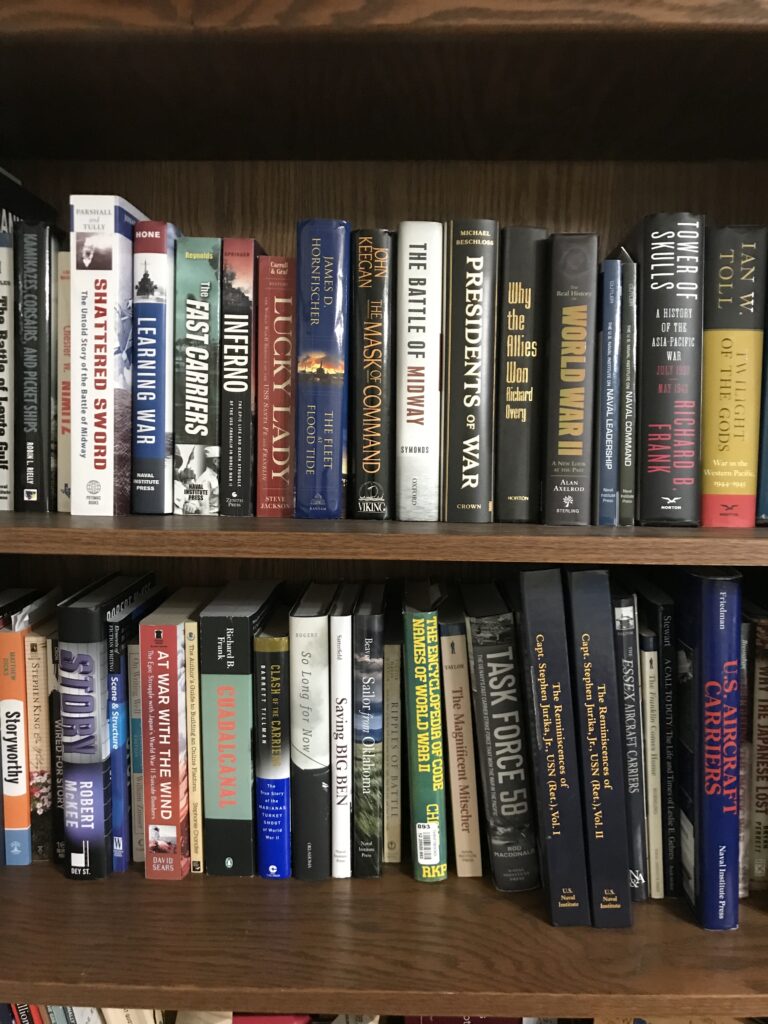My Three Phases of Research
At my Toastmasters meeting yesterday, a fellow member asked me when my book would be ready. I told him it would be a while as I was still early in my research phase. It occurs to me that you might be interested in my research plan.
PHASE ONE: SECONDARY SOURCES
My research will consist of three phases. I am currently in phase 1 which is focusing on secondary resources (books, articles, documentaries about the events) with some work on primary sources (first person interviews, letters, etc.). Because I want to discuss the US and Japanese strategy during the winter of 1945, this includes books such as Ian Toll’s “Twilight of the Gods,” James Hornfischer’s “The Fleet at Flood Tide,” and Rod McDonald’s “Task Force 58,” among others. I also want to become well versed in Essex-class carrier design and tactics” so in addition to Rod’s book, I’m reading “Fast Carriers,” by Clark Reynolds, “Warbirds of the Sea,” by Walter Musciano and several others.

Specific to the events of the day, you cannot research the Franklin without reading “Inferno: The Epic Life And Death Struggle of the USS Franklin in World War II,” by Joseph Springer. Also important is “Lucky Lady: The World War II Heroics of the USS Santa Fe and Franklin.” These both are oral histories and are valuable sources of information.
I am also scanning the Internet for academic papers, YouTube videos, blog posts, podcasts, and photos on topics related to leadership, the events of the day, damage control, and life aboard a ship in the Second World War.
PHASE TWO: PRIMARY SOURCES
Phase two will focus more on primary sources (although there will be overlap between this and the earlier phase. I am building a record of oral histories and will be examining the deck logs, after action reports, and papers of the men involved. This means getting out and visiting various libraries and repositories of those involved from Admiral Earnest King to Stephen Juricka, a most fascinating individual who was navigator on the Franklin that day. The problem is that most of these papers are not digitized which means trips to both coasts. (I also plan to visit some of the museum ships when I am in the neighborhood.
PHASE THREE: INTERVIEWING NAVAL AVIATORS
Phase three will be interviewing current and former naval officers to get their take on leadership lessons that can be learned as well as their take on the training the men received and the then state of damage control. I would also like to interview military historians about the evolving strategies employed by both countries.
I face three challenges, none that I see as insurmountable. The first is that I am not an academic. I am sure that I am missing a few best practices when it comes to research that could help save me time. (I looked at entering graduate school but ruled that out for a variety of reasons.) This also means that I do not have a network of fellow historians I can reach out to.
Second, I am not a veteran. I have a visual disability that gave me a 4F classification in my younger “draftable” days. I plan to overcome that by interviewing naval officers and enlisted men and women to mine their expertise in leadership, damage control, navy life, etc. .
Third, Covid has slowed things down. Most research facilities shut down and have only recently reopened. I am in the process of reaching out to them now.
Offsetting these challenges is my passion for this project. I enjoy learning more about the events around March 19, 1945, and I am serious about adding to the scholarship of World War II in the Pacific Theater and this event. I also want to author an engaging book that the casual reader will enjoy.
To answer my Toastmaster friend, my best guess is that I am two years away from publishing. I am in no rush; I am quite serious about adding to the scholarship which means I’ll leave no stone unturned in my research.
2 Comments
Leave a Comment
You must be logged in to post a comment.
[…] my research on the USS Franklin (CV-13) I am studying the role of radar. Radar was still not 100% effective in March of 1945 and the USS […]
[…] of Operations (PTO). Originally released several years ago, it’s now available on DVD. As part of my research on my book about Big Ben and its crew, I watched it last […]